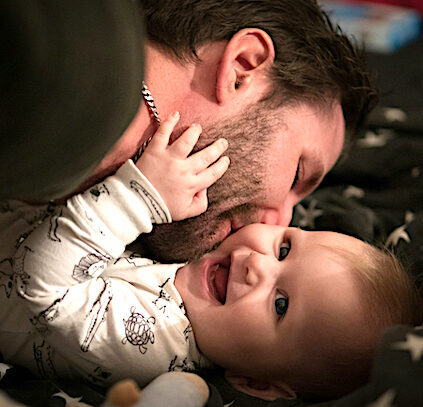Pre and Postpartum Mental Health
The journey to parenthood is often painted with images of glowing anticipation and boundless joy. While these moments are undoubtedly real, for many new and expectant parents, this transformative period also brings significant mental health challenges.
The past few years has especially been a very challenging time for all parents. According to research, there have been an increase in depression and anxiety in mothers in Canada during the recent pandemic. Pre-pandemic, women and mothers have been struggling with mental health concerns for generations. Dads have also been struggling, but this is a lesser talked-about issue; nevertheless it exists and needs to be addressed.
Perinatal Mood and Anxiety Disorders (PMADs) – or pre- and postpartum mental health as they are more commonly known – are among the most common complications of pregnancy and childbirth. Statistics Canada reported that approximately one-quarter (23%) of mothers who recently gave birth experienced symptoms consistent with postpartum depression or an anxiety disorder.
The true numbers may be even higher due to under-diagnosis and the persistent stigma around mental health in new parenthood.
It can affect any mother regardless of age, race, culture, income, or education.
The journey to parenthood is an emotional time for both moms and dads. Emotions could range from joy and excitement, to stress, to health concerns, and to the actual birth itself. Pregnancy could mean significant hormonal, mood, dietary, and sleep issues. Navigating this time of their lives and preparation for parenthood may be a challenge for some.
Perinatal Mood and Anxiety Disorders

PMADs are not just limited to postpartum depression (PPD), though PPD is the most widely recognized. They include:
Perinatal Depression: Persistent sadness, low energy, loss of interest in activities, feelings of guilt or worthlessness, changes in sleep and appetite, and difficulty bonding with the baby.
Perinatal Anxiety: Excessive worry, panic attacks, intrusive thoughts (often about the baby’s safety), restlessness, irritability, and trouble sleeping. Postpartum anxiety is actually more prevalent than PPD.
Perinatal Obsessive-Compulsive Disorder (OCD): Characterized by intrusive, unwanted thoughts (obsessions) that can be distressing (e.g., fears of harming the baby), leading to repetitive behaviours (compulsions) to reduce anxiety.
Post-Traumatic Stress Disorder (PTSD): Can arise from a traumatic birth experience or previous trauma, leading to flashbacks, avoidance, heightened anxiety, and emotional numbness.
Perinatal Psychosis: A rare but severe condition characterized by extreme mood swings, delusions, hallucinations, and confusion, requiring immediate medical attention.
Perinatal Depression
Prenatal depression is a mood disorder that occurs prior to birth. Pregnant women may feel extreme sadness, anxious, fatigued, scared. During their pregnancy, women may experience an increase in the severity of an existing mental health issue.
A woman with self-esteem issues may find her expectations of herself spiralling out of control during her pregnancy, leading to extreme thoughts of inadequacy and shame. Someone who has severe anxiety may find her perfectionistic tendencies affecting her relationships with loved ones, making her pregnancy a difficult time.
Pregnant women may also be dealing with other issues that lead to depression, for example, intimate partner violence, an unplanned pregnancy, lack of support, substance use, or other issues such as housing, finances, etc.
Motherhood can be a challenging and life-changing time for many moms. Counselling for depression during pregnancy is important so that the expectant mom could take better care of herself, and be in a position to bond with her newborn child. It may also help to decrease the risk of postpartum depression.

Postpartum depression
Postpartum depression occurs after the birth of a child, and can range from mild to severe. In addition to feelings of extreme sadness and exhaustion, new mothers may also be feeling overwhelmed, restless, irritable, fatigued due to a lack of sleep, and they may overeat to cope.
They may also feel an emptiness, or experience feelings of hopelessness, an inability to concentrate, and possibly suicidal thoughts. These feelings stand in the way of bonding between mother and child, and significantly impacts her relationship with others.
During this time, new mothers may also experience intrusive thoughts that question their worthiness as a mother, about their newborn dying, or their ability to care or help their child. They may entertain intrusive thoughts that are dark, and unhealthy. As a result, they are not able to enjoy their time as a new parent, or to take care of their child.
New Dads
It is important to add that new fathers, the non-birthing parent, may also experience postpartum depression.
A newborn child changes the dynamics in the marital relationship, and brings a new level of responsibility and adulthood that can be overwhelming.
- Increased Risk of Depression and Anxiety: Studies show that 8-10% of men can experience depression in the perinatal period, and up to 18% develop anxiety disorders postpartum. This risk increases significantly if their partner is also struggling.
- Unique Symptoms: Men may experience depression differently, often manifesting as anger, aggression, irritability, increased substance use, and withdrawal from family life.
- Role Transitions and Stress: Coping with new roles, relationship changes, financial pressures, and the need to be the “strong one” can be overwhelming.
- Feeling Overlooked: Society often focuses solely on the birthing parent’s mental health, leaving partners feeling isolated and reluctant to seek help.
- Impact on Child Development and Relationship: Untreated PMADs in either parent can negatively affect parent-infant bonding, child development, and strain the couple’s relationship, leading to communication problems and conflict.

The lack of sleep, the constant attention to the newborn child, feeding, changing, etc, can lead to depression, especially if struggles with mood was a factor prior to birth. Read more about the challenges that new dads face.
Similar types of treatment given to mothers could also be beneficial to fathers with paternal postpartum depression.
Therapy Options for New Parents
The good news is that perinatal mental health conditions are highly treatable. Seeking professional help early can significantly improve outcomes for parents, babies, and the entire family.
Here are common therapeutic approaches available to new parents in Canada:
Cognitive Behavioural Therapy (CBT):
- What it is: A highly effective talk therapy that helps individuals identify and challenge unhelpful thought patterns and behaviours that contribute to anxiety and depression.
- How it helps: New parents learn practical strategies to manage stress, improve mood, and develop healthier coping mechanisms. CBT groups specifically for new mothers are also available in many regions of BC.
Interpersonal Therapy (IPT):
- What it is: Focuses on improving communication skills and addressing relationship issues, as interpersonal challenges often impact mood.
- How it helps: Ideal for new parents navigating relationship changes, conflicts with partners, or struggling with feelings of isolation.
Supportive Counselling:
- What it is: Provides a safe and confidential space for new parents to express their feelings, process their experiences, and receive empathetic listening and guidance.
- How it helps: Offers emotional support, validation, and practical advice for navigating the challenges of new parenthood.
Mindfulness-Based Therapies (e.g., MBCT):
- What it is: Integrates mindfulness practices with cognitive behavioural strategies, teaching individuals to observe their thoughts and feelings without judgment.
- How it helps: Can reduce stress, anxiety, and depressive symptoms by fostering greater present-moment awareness and acceptance.
Eye Movement Desensitization and Reprocessing (EMDR):
- What it is: A therapy designed to help individuals process traumatic memories and reduce their emotional impact.
- How it helps: Particularly beneficial for parents who experienced a traumatic birth or have a history of trauma contributing to their current struggles.
- What it is: Focuses on the relationship dynamic between partners, improving communication, resolving conflicts, and strengthening their bond.
- How it helps: Essential when both parents are struggling, or when their individual struggles are impacting the relationship.
When Should I See a Counsellor?
If you are a new parent, and you find that your feelings of sadness have lasted for more than 2 weeks whether it be prenatal or postpartum, it would be helpful for you to meet with a counsellor. If you are feeling overwhelmed, empty, or helpless, please call us.
Organizations like the Pacific Post Partum Support Society offer invaluable peer support and resources in BC.
Many mental health professionals specialize in perinatal mental health and can offer individual, couples, or group therapy. Don’t hesitate to reach out. Your well-being, and the well-being of your family, is worth prioritizing.
Remember: You are not alone, you are not to blame, and with help, you will feel better.
When to Call for Help
If you have experienced intrusive thoughts of hurting yourself or your child, talk to your counsellor about it.
If you do not have a counsellor, you could:
- Call 911, or
- Talk to a close friend or family member
- Reach out to your medical care practitioner
- Ask someone to take you to the nearest ER as soon as possible, or
- Call the BC Crisis Line 1-800-784-2433 (1-800-SUICIDE), or
- Call Talk Suicide Canada 1-833-456-4566

